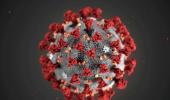'Testing is a very good strategy if only symptomatic people are transmitting the disease.'
'Here asymptomatic people, with minimum, trivial symptoms, are transmitting too.'
'Testing, treating, tracing contacts and quarantining them -- yes, it will work up to a certain extent.'
'But more important is physical distancing, hand hygiene, cough etiquette and cocooning, protecting with reverse quarantining the most vulnerable people, senior citizens, people with other major medical problems.'
'To me, that makes much more sense.'

Dr O C Abraham is a senior member of the clinical research group, a medical task force that counsels the Indian Council of Medical Research.
An expert in infectious diseases, he is the professor and head of the department of one of the units of internal medicine at the Christian Medical College, Vellore, Tamil Nadu.
Dr Abraham offers Vaihayasi Pande Daniel/Rediff.com a long-term, cautious view for India as it confronts the COVID-19 pandemic. The second of a three-part interview:

From your point of view, from the medical point of view, since we don't have a vaccine, what is the best standard line of treatment?
Is it for some HIV drugs and others hydroxychloroquine, in case they works?
Now there's a lot of talk about this drug, that was manufactured for Ebola, Remdesivir.
There's, of course, ivermectin, but that's a very small study.
What is it that you are advising?
Unfortunately, there is no drug which has been shown to be effective.
All the information we have is (from) experiments done in the laboratory in a test tube.
It kills the virus in a test tube.
None of the drugs tried till date, hydroxychloroquine, Remdesivir, the HIV medicines, none of them have been actually conclusively shown to be of benefit.
At the moment, for people who are sick enough to come into the hospital --it's mostly respiratory failure, they have trouble breathing, they have other complications also -- the best possible option is supportive care.
That is the best treatment as of today.
All these others are experimental therapies.
It may be, that some of them may be tried as a last-ditch effort.
None of them are a kind of standard of care, I would say.
But what it is being administered generally in India?
HIV drugs?
Or what is it?
HIV drugs are not part of the ICMR guidelines.
They revised their guidelines.
The ICMR guidelines now have only hydroxychloroquine, I think.
All these are experimental therapies, if I may say so.

There's nothing really that is standard as such?
No, no.
Till now none of the main drugs (suggested have worked).
A big study from China, a randomised controlled trial, showed that Lopinavir, the HIV medicine, did not have any effect (an RCT study tests the effectiveness of a drug. In this clinical trial, patients are randomly allocated to receive a drug. Those that don't receive the drug and receive a placebo or 'sugar pill' and serve as the control or standard of comparison.)
All the evidence about hydroxychloroquine it has not been shown to be (effective) -- maybe it reduces fever by one day.
Not a miracle drug, no.
But there is a small possibility that this Remdesivir might work? Or we don't know?
We don't know.
Unfortunately, even if you look at history, for none of the acute viral infections is there a good treatment.
Even treatment for flu is kind of so-so -- like it reduces fever by one day.
The chronic viral level infection, HIV, hepatitis C, fantastic -- it is almost as good as cured.
Hepatitis is cured.
HIV almost as good as cured.
Active viral infections, whereas diarrhea or encephalitis maybe can be treated.
Most of them do not have good treatment.
Ebola, there is no good treatment.
Remdesivir was tried in Ebola.
They stopped the trial in between... Because there was no benefit from Remdesivir.
History is not on our side.

What you are saying is that even a common cold, which is viral, doesn't yet have a remedy.
So, it's like, unlikely that these ailments are going to get a remedy so soon.
Correct.
That's your line of thought?
I am also hoping and praying that there will be a cure, some day.
But, unfortunately, as of today, none of them, from my reading, has been shown to be even (slightly effective).
Yes, they are there in trial.
Studies going on... so...

Testing, everyone says, is important.
But given India's population, even if you keep pouring the tests in we will be lagging behind.
How do you ramp up testing for so many millions of people in India?
That statement 'Test, test, test', attributed to Dr Tedros (Dr Tedros Adhanom Ghebreyesus, director-general of the World Health Organisation) will go only to a certain extent in controlling this epidemic.
Not saying you should not test.
You should test.
Like I said, this virus is a highly contagious virus and very easily transmitted from people to people.
There are people with absolutely no symptoms or minimal symptoms who will not consider even taking a day off or going to the doctor.
A little bit of cough.
A little bit of body ache.
A little bit of fever, feeling a little tired.
You are still transmitting the virus.
So then why are you testing?
So you diagnose patients early, you isolate them (because you know there is no vaccine, no treatment) and you trace the contacts and quarantine them.
That's a very good strategy, if only symptomatic people are transmitting the disease.
Here asymptomatic people, with minimum, trivial symptoms, are transmitting too.
Testing, treating, tracing contacts and quarantining them -- yes, it will work up to a certain extent.
But more important is physical distancing, hand hygiene, cough etiquette and cocooning, protecting with reverse quarantining the most vulnerable people, senior citizens, people with other major medical problems.
To me, that makes much more sense.
What the UK is trying to do.

In Wuhan, one of the ways they used to stamp it out was to do a really lot of testing?
Initially, they were caught completely off-guard.
But in early or mid-January, they locked the whole town down, completely.
You were not allowed to get out of your house.
And they tested.
They went house to house.
They took out everybody who was ill.
If you were very sick, you went into hospital.
Otherwise you went into a care centre.
They were isolated.
So:
Quarantining and isolation.
And complete lockdown.
Of course, they ramped up the hospital capacity.
Doctors and nurses and technicians came from all over China.
Temporary hospitals were built.
They did a fantastic job.
(They did it) I think, both ways.
They took care of the sick.
At the same time they had a complete clampdown -- cordon sanitaire (a fortified line preventing anyone from leaving a disease-infected locality/area), you couldn't get out of the front door.
That was how they managed.
- Part 3: When will this pandemic end?
Production: Ashish Narsale/Rediff.com











